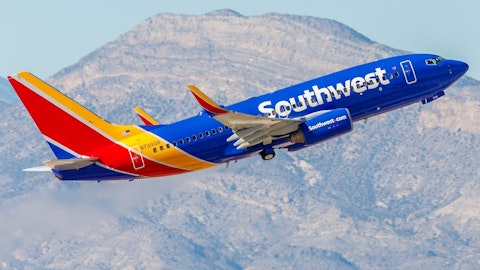Scott Kirby: Well, I think what we need to do is drive the cost down. And so the — for SAF, for example, what I like to think about is wind and solar energy, which because I’ve been a climate change geek for 30 years, I followed it, but it was 20 years ago, certainly 30 years ago. 20 years ago, everyone, everything you read or talked about wind and solar was it could never compete with fossil fuels, it could never be economic. Well, guess what? We passed legislation that had credits — a carrot instead of just a stick, carrot. That carrot drove massive investment in R&D, drove economies of scale. And today, it’s cheaper to produce a megawatt of electricity from wind and solar than it is from fossil fuels. And the same thing can and I believe will happen with SAF.
It is more expensive today, but we are in the very early phase of the development curve. And that’s what’s great about the Inflation Reduction Act is it creates those same kind of financial incentives that existed for wind and solar. And that is — we know it because we’re involved with the companies. It’s driving investment into the space. And that’s what is needed right now at this phase, and that investment is going to lead to breakthrough is going to lead to economies of scale. And I think the costs are going to come down.
Operator: Our last question is from Bill Murphy from Inc.com.
Bill Murphy: I have two quick questions. The first, I believe if I understood, Scott, previously, you mentioned an unprecedented number of new pilots actually coming to United from other airlines. And I understand, of course, hiring especially, but not limited to pilots as a big industry constraint, a big effort, so. But I’m wondering, can you say anything more about that? Is this an effort specifically involved here now to recruit away from competitors in a way that you haven’t in the past? And if so, how do you go about doing that practically from — besides simply positioning the airline is a good place to work? And I would have a follow-up.
Scott Kirby: It’s really the latter. It’s not a targeted airline to go after them, but people pay attention and United is the best place to work. And if you’re a pilot and want to work at the best place, a lot of them are just putting their applications in. We don’t need to do anything more than be the biggest and the best airline in the history of aviation, and that’s enough of a sell point.
Bill Murphy: Okay. So, no specific numbers to report on that you — an uptick on that.
Scott Kirby: Well, I don’tknow what the numbers are I’m — by anecdote I asked people. And I would guess that 30% of the people in those classes come from one of the large airlines. That’s just my eyeballing it in the room. But somebody at United probably knows the numbers, but I don’t know the specific numbers. I’m just proud of everything that team is doing.
Bill Murphy: And if I can just — my other follow-up here. In previous calls and interviews, you’ve talked about kind of changing customer demographics, including things like the rise of work from anywhere of leisure passengers. I’m just wondering, if you have anything more to add to that now in terms of how you see that changing structurally in the post-pandemic world.





